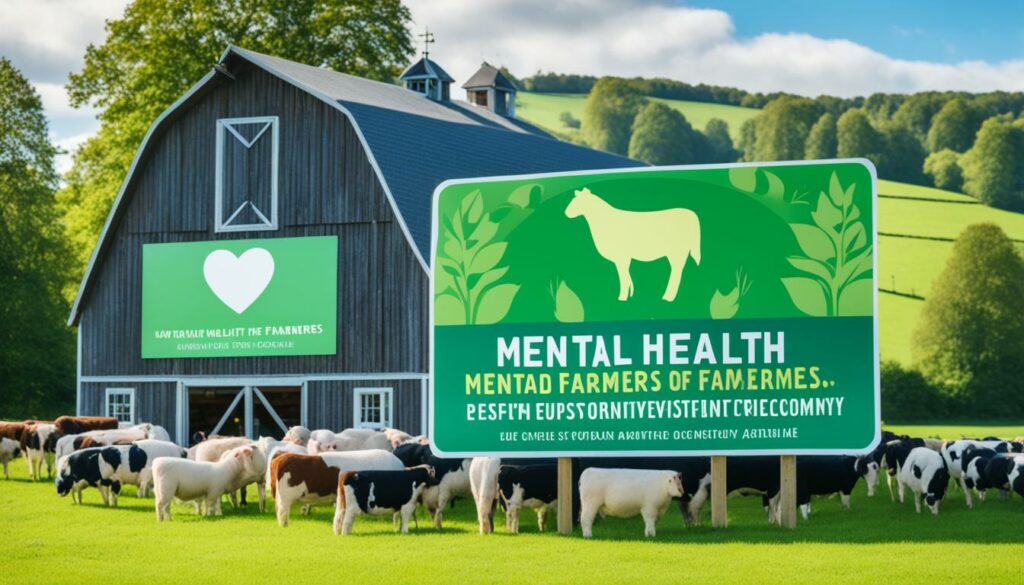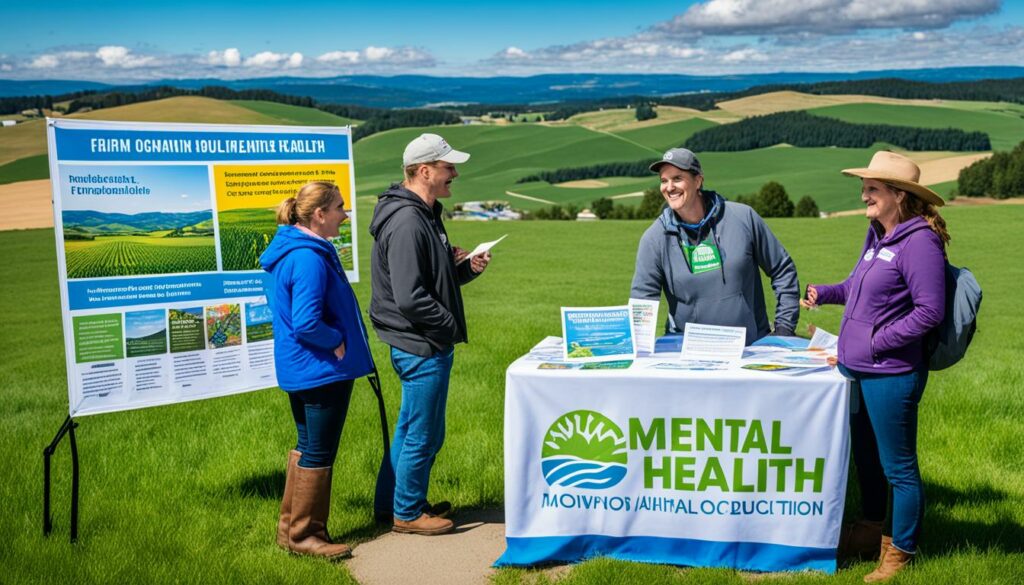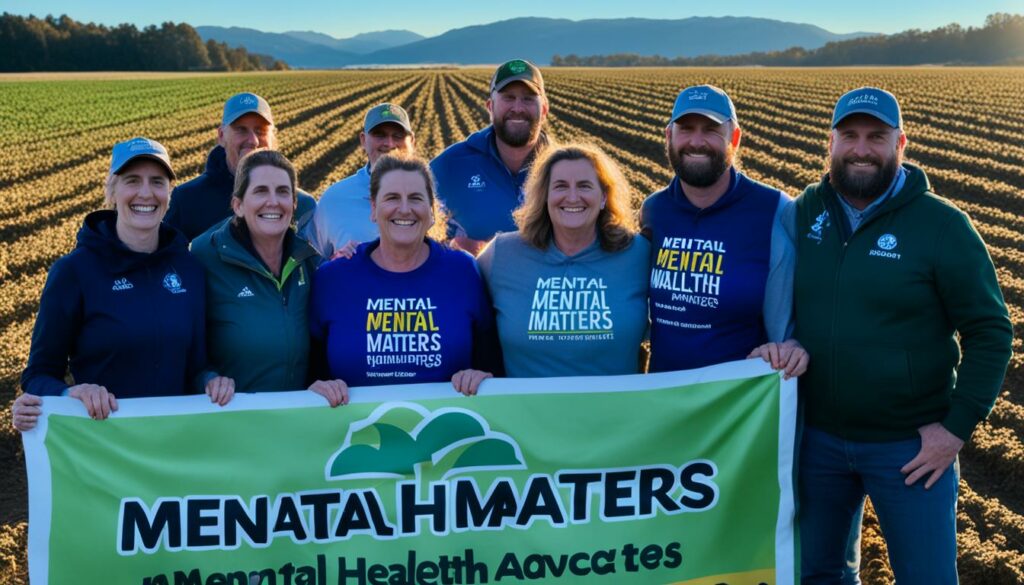Menu

Did you know the U.S. male farmers’ suicide rate was 43.2 per 100,000 in 2016? This figure is much higher than the 27.4 per 100,000 for males in all jobs. It shows how hard mental health issues hit those in farming.
Farmers face a lot of stress. This is because their work is not stable, and they deal with bad weather. Being far from cities can make getting help for mental health tough. This is where farm groups step in to help and make a difference.
The American Farm Bureau’s Farm State of Mind campaign is a great example. It aims to reduce shame around mental health and make it easier for farmers to get help. It is important that we support these unique challenges. This way, rural farming areas can flourish and their people can lead good lives.
Rural farming communities face many mental health issues. They deal with tough work and issues like not knowing if they can make enough money. Being far from others can also make them feel lonely and affect their mental health. The ups and downs of making a living can really burden their minds.
Farming’s ups and downs can make mental health challenges even worse. Back in the 1980s, a tough time made many feel very anxious and down. Today, farmers deal with things like prices changing, hard debts, and fights over trade. Not knowing if they can keep going can lead to deep sadness and worry.
It’s very important to offer mental health help to farmers. They need ways to handle these stressful times.
Living far from others can hurt mental health in farm areas. Many times, there aren’t enough mental health services close by. This can make people feel very alone and sad. It’s really important for groups that understand farming to help out. Studies show that people in the countryside often face more mental health issues than those who live in towns. This shows we really need to focus on helping them.
Here’s a stark fact: In 2016, the suicide rate for male farmers and ranchers in the U.S. was high. It was 43.2 per 100,000. This was higher than the rate of 27.4 per 100,000 for males in all jobs. Even though these numbers are worrying, there aren’t enough mental health services. It’s crucial we do more to support farmers during tough times and after hard events.
Farmers’ mental health has always been linked to the economy, especially in the farming world. The 1980s’ farm crisis stands out as a clear example. It showed how tough economic times can lead to serious mental health issues in rural areas. This connection between money problems and mental health is true both then and now.

The 1980s were hard on farmers, bringing a lot of stress. The bad economy hurt their mental health. Gregoire (2002) talked about how people in farming were very worried. Jobs in farming saw more suicides, with a male suicide rate of 43.2 per 100,000 in 2016. This was much higher than for men in other jobs, which was 27.4 per 100,000.
Todays farmers are facing problems like those in the 1980s. Things such as money issues and bad weather add to their stress. This stress can make mental health worse. It’s important for farm organisations to learn from the past and support mental health well. Ringgenberg et al. (2017) found that suicide rates are still high among farmers. This shows how important it is to offer mental health support to avoid crises.
Farmers face issues then and now, like dealing with changing markets and bad weather. This can lead to high stress and anxiety. It’s critical for the whole farming community to stay alert and use old lessons. This will help them support mental health better while facing current challenges.
Farmers’ mental health is vital for their happiness and work. They often deal with many problems like money worries, feeling alone, and hard physical work. These can all make their mental health worse.
Stress can cause a lot of harm. It can make people angry, give them headaches, keep them awake at night, and can even lead to serious diseases like heart disease and diabetes. These issues lower what farmers can do each day and harm their bodies.
Depression is a big problem facing farmers in the U.S. It causes people to feel sad, worried, lose interest in their favourite things, and feel very tired. This all makes it tough for farmers to work as hard as they need to.
More needs to be done to help farmers with their mental health, especially because of high suicide rates. In 2016, more farmers died by suicide than people working in other jobs. Studies show that farmers are at much higher risk of suicide than most other workers. This shows why it’s so important to give farmers special help with their mental health.
| Statistics | Suicide Rate |
|---|---|
| Male Farmers (2016) | 43.2 per 100,000 |
| Male Working-Aged Adults in All Occupations (2016) | 27.4 per 100,000 |
Farm organisations are making big changes in mental health support. The American Farm Bureau Federation and the National Farmers Union lead these efforts. They offer farmers help to reduce the stigma around mental health. This includes crucial resources and pushing for better policies.

The American Farm Bureau Federation is at the forefront with many projects. For instance, they started the ‘Farm State of Mind’ campaign. It aims to teach and fight against stereotypes of mental health in rural areas. Through this, more farmers are learning to get help and find support, showing the federation’s strong support for mental health causes in farming areas.
The National Farmers Union set up the Farm Crisis Center for important mental health help. This centre connects farmers with key info and services. It includes private hotlines and links to mental health experts. The Union shows its firm commitment to mental health advocacy in farming. They work hard to set up a caring space where mental health needs are seen and met.
Farm organisations are key in helping farmers deal with mental health issues. They have special *mental health strategies in agriculture* to fight the stress farmers face. These groups know that it’s important to look after both the farmers’ mental and physical health.
They offer crisis hotlines as part of their strategies. Avera Health System in South Dakota runs the Farm and Rural Stress Hotline. It’s a 24/7 service that is free and private. Farm Aid also has a hotline (1-800-FARM-AID) for farmers to call and get help.
These organisations also have *rural community wellbeing programs* to support the whole farm community’s mental health. They provide resources, education, and training to increase mental health understanding. This is to help everyone spot and support those going through mental health problems, creating a caring environment.
Working together is a big part of their strategy. By teaming up with healthcare providers, mental health services become more available in remote areas. They also partner with organisations like the National Alliance on Mental Illness (NAMI) to offer free help to families facing mental health issues.
The issue of mental health in farming is serious. In 2016, suicide rates were much higher for farm workers than for other jobs. This highlights how important farm organisations’ mental health programmes are. They are working to lower these tragic numbers and they aim to make farming communities stronger and mentally healthier.
There are many detailed *mental health strategies in agriculture*. They offer support in many ways, like through educational workshops. Groups like the National Farmers Union (NFU) and RAFI-USA help by promoting healthy farm practices. They also provide mental health resources and support to farmers and their families.
In conclusion, farm organisations are doing a lot to help the mental health of farmers. They are always finding new ways to support farm workers’ mental and emotional health. By understanding and addressing the unique pressures of farm life, they help farmers stay mentally well.
For farmers, access to mental health support during a crisis is crucial. Farming jobs are extremely stressful, especially with uncertainty over money and being far from others. Hotlines such as the Farm Aid Hotline and the 988 Suicide and Crisis Lifeline offer immediate help. They are essential in providing support quickly.
Since over 30 years, Farm Aid has helped family farmers in need due to natural disasters and crisis. The Farm Aid Hotline, 1-800-FARM-AID, is available Monday through Friday. From 9am – 9pm ET and 6am – 6pm PT, it offers both emotional support and practical advice. Experts like Caitlin Arnold Stephano and Elizabeth Gonzalez Ibarra are on hand. They provide help, including mental and physical health resources and support for Latinx farmers.

The 988 Suicide and Crisis Lifeline is a crucial support for everyone in need, including farmers. Farm operators and workers face higher suicide rates than many other jobs. This lifeline, particularly given the rise in mental illness in rural areas, is a lifesaver. It helps combat mental health issues worsened by the lack of mental health providers.
The 2-1-1 Local Resources Hotline links farmers to vital local supports, including healthcare and financial help. In areas with a shortage of mental health services, it’s especially important. This service ensures help is available everywhere, fighting mental crises and supporting well-being.
| Resource | Description | Operating Hours |
|---|---|---|
| Farm Aid Hotline | Provides emotional support and practical guidance | Mon-Fri, 9am – 9pm ET / 6am – 6pm PT |
| 988 Suicide and Crisis Lifeline | Immediate support for suicide and mental health crises | 24/7 |
| 2-1-1 Local Resources Hotline | Connects to local health services and financial support | 24/7 |
Rural areas often face higher rates of mental illness and suicide than cities. This has led to more focus on mental health initiatives in the countryside. Farm organisations are working hard to create projects specifically for rural mental health.
In the countryside, community-based mental health initiatives are key. They include campaigns, workshops, and support groups. These efforts make sure mental health help is where it’s most needed, helping locals feel supported. This is crucial as rural areas see more depression and suicide.
These local programs fight the stigma of mental health. They encourage people to talk openly about their feelings.
Working with local healthcare providers is vital for rural mental health projects. Because of the lack of specialists in the countryside, treatments can be missed. By teaming up with healthcare services and using telemedicine, more help is made available. For example, the Rural Mental Health Resilience Program offers practical resources and support for running community events.
An example of the need for action is the high suicide rates among farmers. One study found a rate of 43.2 per 100,000 for male farmers in 2016. The goal of rural mental health initiatives is to reduce these numbers. They aim to improve mental health and resilience in rural communities through local and medical collaborations.
It’s key to focus on education to tackle the stigma around mental health in farming areas. A mix of methods is used. This is to make sure people learn about mental health and to improve how we talk about it in the countryside.
Events like workshops and training sessions help farmers understand mental health. They learn about conditions such as depression and anxiety. These events also offer ways to manage stress. This knowledge helps farmers to spot and deal with mental health issues early. Also, by making seeking help seem normal, these sessions help cut down on the stigma.

Getting the word out through campaigns is crucial. They tell people about how common mental health problems are in rural areas. For example, they might share that the suicide rate is higher among farmers than other working adults. Facts like these aim to lower the stigma around mental health in farming communities.
These efforts also teach farmers about mental health. This way, they can find the help and resources they need. This helps create a community where mental health issues are talked about and dealt with properly.
“The impact of mental health education in rural communities cannot be overstated. It is through informed and compassionate support that we can truly diminish the stigma associated with mental health issues.” – American Farm Bureau
Important mental health advocacy has made a difference in farming. The American Farm Bureau Federation and the National Farmers Union are key examples. They both have strong mental health plans, helping those in their rural communities.
The American Farm Bureau Federation launched the Farm State of Mind campaign. This effort aims to stop the shame around mental health and offer farmers the help they need. It helps by making mental health issues known, creating support groups, and telling farmers it’s okay to ask for help.
The National Farmers Union stands out with its Farm Crisis Center. This special center helps farmers in tough times, such as the 1980s Farm Crisis. It gives counselling, crisis advice, and teaches farmers how to handle mental health problems, building a strong community spirit.
Both these cases show the power of organised support in farming. By carefully planning mental health support, farm groups can really change lives. They help farmers improve their mental health, leading to better lives in rural areas.
Improving mental health support for farmers is key. Telemedicine in rural parts is vital. It helps overcome distance and lack of health services. This way, farmers get mental health help without leaving home.

Telemedicine is a game-changer for rural mental health. Services are often short-staffed and poorly equipped. By offering online support, farmers get the help they need. This includes coping with financial worries and the stress from natural disasters.
Putting mental health services in rural clinics is a big plus. Farm groups and health providers work together on this. They place specialists in local clinics, providing all-around care. This also builds trust, making people more likely to seek help.
Imagine this comparison:
| Category | Rural Areas | Urban Areas |
|---|---|---|
| Mental Illness Prevalence (2017) | Higher | Lower |
| Access to Mental Health Services | Limited | Greater |
| Suicide Rates among Male Farmers (2016) | 43.2 per 100,000 | 27.4 per 100,000 |
This tells us that rural areas need more mental health help. Collaborations between farms and health providers are first-rate. They work to better mental health in farming communities.
Farming and ranching bring many unique stressors that deeply affect mental health. The main issues are the unpredictable weather and the financial ups and downs. These put a heavy load on farmers and ranchers.
Natural disasters are a big threat to farms, wiping out crops or herds. This constant risk leaves farmers and ranchers under a shadow of anxiety. They are always worried, facing mental health challenges.
“During the 1980s Farm Crisis, the suicide rate among farmers and ranchers increased dramatically due to immense economic pressures.”
Living through these disasters can cause depression and anxiety. Support like natural disaster resilience programs and mental health services is crucial.
Agriculture’s financial uncertainties are also a major concern. Prices change, debts rise, and disputes affect daily life for many in agriculture. This leads to mental strain and, sometimes, suicide.
In 2016, the male suicide rate among farmers and ranchers was 43.2 per 100,000, starkly higher than the general male population’s rate of 27.4 per 100,000.
We need to offer farmers help in the face of these financial challenges. This help should be designed specifically for their unique economic stressors. It could lower the emotional and mental toll.
| Stressors | Impact | Suggested Support |
|---|---|---|
| Natural Disasters | Increased Anxiety and Depression | Disaster Resilience Initiatives |
| Market Volatility | Financial Strain Leading to Suicide | Specialized Mental Health Support |
Farmers often deal with many obstacles, highlighting the need for easy mental health support. Luckily, there are plenty of online mental health tools and helplines that are ready to help.

In the United States, there are helplines and online tools specifically for farmers’ mental health:
Another vital part is the self-care and stress management advice. Online tools offer guides for reducing stress through mindfulness, exercise, and finding a good balance between work and life.
Organisations such as F.E.A.S.T. and DBSA stress the need for personal self-care plans. They aim to guide farmers through their tough jobs and help protect their mental health from stress.
These tools and resources help farmers learn and apply self-care, reducing stress and improving mental well-being.
The mental health of farmers and ranchers is a growing worry. The suicide rate among them was 43.2 per 100,000 in 2016. This is much higher than other jobs. Clearly, farmers need the government’s help with their mental health. Good policies are key to looking after these workers.
Governments can make a big difference by passing laws that help farmers’ mental health. For example, they might require mental health checks. They could also invest in prevention and teach people in the countryside about mental health. Strong laws can lower mental health problems among farmers.
More money and resources for mental health are very important. Often, mental health services aren’t easy to get in the countryside. Around 60% of people there can’t find healthcare easily. Government help can build better mental health care, like more online doctor visits. This can make farmers feel less alone.
Support from the government for farmers’ mental health needs to cover many areas. We have to help right now and also plan for the future. With a wide-spread mental health strategy, we can make farming a stronger and healthier field.
We’re facing new challenges in how we look after farmers’ mental health. To meet these, we need new and advanced mental health tools. These will help farmers all over the United States stay well.

New tech is changing mental health care for rural areas. Digital tools and telehealth can bring support to farmers, no matter where they are. This means help is available quickly and privately, getting around the fear of being judged.
Farmers can also learn mental health skills in their daily work. There are apps just for them, which offer ways to manage stress and connect with experts. This proactive approach is key to overall mental wellness.
The stigma around mental health is still a big problem. Openness and support are crucial in helping farmers spot and handle mental health challenges. Awareness drives, led by farm groups, are important. They help reduce stigma, making it easier for farmers to talk and seek help.
Workshops and events in communities teach farmers about mental health. They share how important it is to get help. These efforts make a safe space for talking about mental health in farming.
To sum up, the future of farming community mental health work depends on using new mental health tech and fighting against stigma. If we do these things, farmers will have what they need to stay mentally strong and do well in their work.
After studying farm mental health, it’s clear we need many strategies to support farmers. Farmers in places like Iowa and Colorado often feel low. They need strong help from their communities and the government.
High numbers of farmer suicides show we must act fast. Issues like dangerous chemicals and money troubles stress them out a lot. Farm groups should keep pushing for better mental health care that fits farmers’ needs.
We can help by using new methods like talking to doctors online. Working closely with healthcare workers is important, too. Being in nature helps farmers feel better.
By always working hard to help farmers, we can make their lives better. Let’s keep up the good work for them and for our farms.
Farm organisations help by making mental health issues known. They offer mental health resources and push for policies that help farming areas. Their work includes setting up crisis help, teaching about mental health, and working with health groups.
Economic ups and downs can really stress out farmers. This includes when prices for their goods change a lot. Such financial pressures, seen in the 1980s crisis, can make farmers feel very down.
It’s hard for farmers to get to mental health support because they live far away. Also, there aren’t many health workers in these areas. So, farmers often don’t get the mental health care they need quickly.
The 1980s crisis hit farmers hard, affecting their lives greatly. This brought much stress, leading to more sad feelings, and sadly, more suicides. It showed how important mental health support is during tough times.
Today’s farm problems share a lot with those of the past. Farmers face difficult markets and changing weather. These ongoing issues show the need for better mental health help and understanding to protect farmers’ well-being.
Good mental health helps farmers work well and feel good. By looking after their mental health, they can be better at their jobs. This is important for their own well-being and for the farms they run.
In 2016, the suicide rate for male farmers reached 43.2 per 100,000 people. High rates are linked to tough farm finances, feeling alone, and the hard work of farming. This shows the urgent need for mental health know-how and support.
The American Farm Bureau Federation started the Farm State of Mind campaign. It aims to offer mental health help, fight the stigma, and push for policies supporting farmers’ mental health.
The National Farmers Union’s Farm Crisis Center helps farmers get mental health info and support. It focuses on teaching, speaking up, and offering urgent help for those in a mental health crisis.
Farm groups use hotlines, teach mental health basics, and do training together to support farmers’ mental well-being. They also work closely with healthcare partners. These efforts aim to tackle what makes farming particularly stressful with practical help.
For immediate help, farmers can call the Farm Aid Hotline, the 988 Suicide and Crisis Lifeline, or use the 2-1-1 Local Resources Hotline. These services connect farmers with the right local mental health help quickly.
Community-based mental health projects and working with local healthcare improve mental health care in rural areas. These steps help build a stronger community that looks after each other’s well-being.
Learning things through workshops and campaigns is helping farmers understand mental health better. This makes it easier to seek help when they need it. Such efforts aim to make life better for farmers by changing old views about mental health.
Successful projects from the American Farm Bureau Federation and National Farmers Union show the good that focused mental health care work can do. They prove that having a lot of mental health support and well-organised help in farming areas really works.
Telemedicine lets farmers get mental health advice without a long trip. It’s a big help, putting mental health care into rural healthcare. This makes getting help easier and much more available.
Natural disasters and market shifts bring big worries to farmers and ranchers. They can have a heavy mental toll, needing special mental health care and someone to stand up for their needs.
Farmers can use online resources, talk to helplines, and find guides on taking care of themselves and managing stress. These are key in getting fast, easy-to-use support for mental health issues.
Governments are key in making sure farms get mental health support. Laws and money for mental health care mean farm groups can do more to help. This support is important for looking after farmers’ mental health.
Farming areas will see new ways to offer mental health support, and focus more on fighting mental health stigma. Digital mental health platforms and local solutions will make help easier to find. This will really boost the help farmers can get for their mental health.